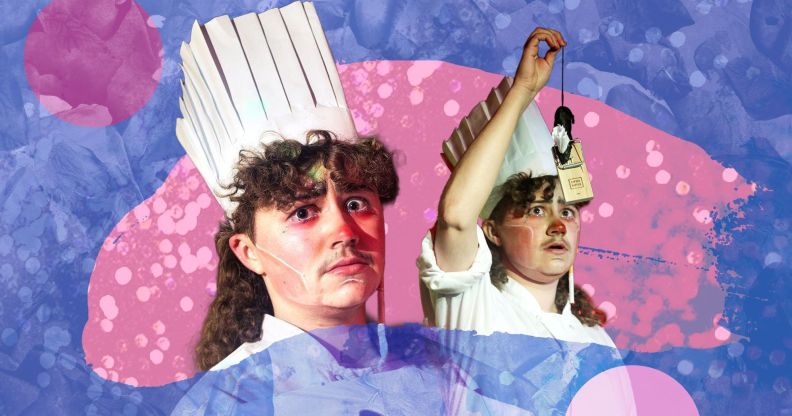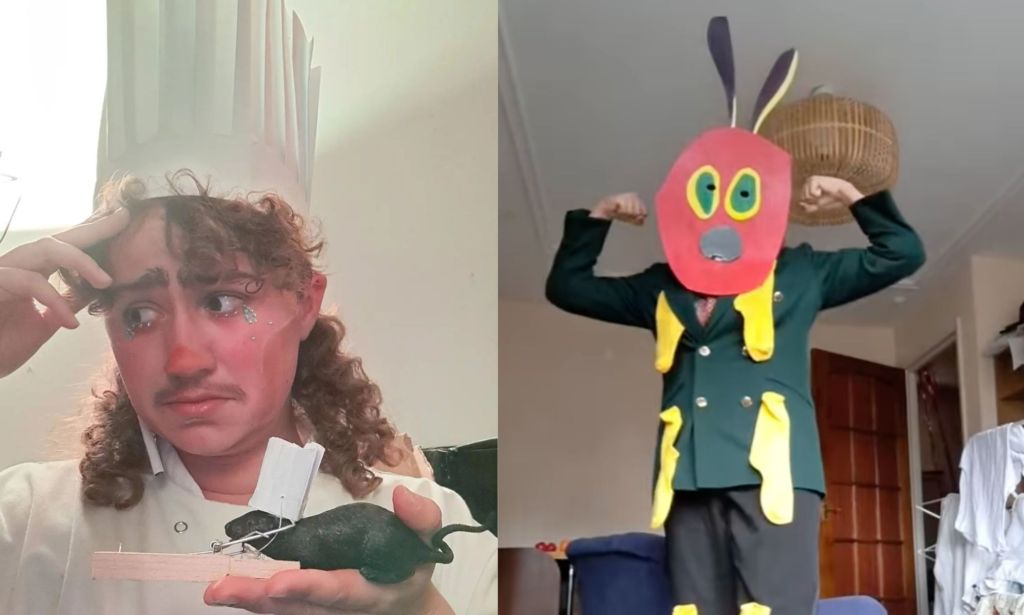‘I get to be this forever’: How a trans artist found ‘home’ in the drag king scene

Trans drag king Percy Non Grata found a “home” in the drag scene. (Greyson Askew/loumacphotography)
For drag king Percy Non Grata, the stage isn’t just where he loves performing and doing “ridiculous” things, it’s also where he found a “beautiful” community and a place the trans artist now calls “home”.
At its core, drag is a creative act that showcases the fluidity of gender and is a powerful and personal form of expression for performers like Percy. Drag gave Percy the power to push boundaries, find community and further embody his authenticity as a trans person.
In June, the London-based king posted a TikTok of a campy-but-tragic funeral for Remy, the rat from the Disney-Pixar film Ratatouille. The video, which now has over 1.1 million views, sees Percy – dressed as garbage boy turned faux chef Alfredo Linguini – honour his late friend with a touching performance to Celine Dion’s hit song “It’s All Coming Back to Me Now”.
Percy tells PinkNews that the viral fame is “weird” as it was all “very sudden” and “very intense”, but it’s given him a platform to spread love about drag kings.
Percy tells PinkNews that he was stunned by the TikTok fame. He “f***king loves” Ratatouille and is a “big fan of rats” so gets the appeal of the act.
“The TikTok fame was weird,” he admits. “It was all very sudden and very intense, but also I’ve grown up in the trenches of Tumblr.
“I remember this discourse. I remember how it goes.”
He explains that drag isn’t just about embodying the Ratatoiulle character while on stage, but has also been a way for him to further accept and celebrate his identity.
Percy has been “transitioning as much as [he’s] been doing drag” so he has seen his growth as an artist marked alongside different milestones in his trans journey.
“Every drag show I go to, I’m like, ‘Look at these horrible little hairs I have! Look at my arm hair!’,” he says.
“I’m so excited about the arm hair, the stomach hair, my voice dropped. Everyone was loving it.
“It’s so wonderful to mesh something I enjoy – creating in a stupid, ridiculous, camp way – into what is really intense about my identity.
“I couldn’t be happier. I feel like I spent so much of my life trying to find a home and not knowing where I fit in or where my people are.
“I look around drag shows, at the stage, at everyone I know and everyone I’ve met and genuinely – I’m on testosterone so I don’t cry anymore – nearly cry about it because this is what I wanted.”

He adds it’s been “so wonderful” to be a part of “beautiful” spaces that are as welcoming as they are affirming.
It’s far removed from his experience growing up in Portsmouth and attending Catholic school. As a young person, he thought transitioning was “something that happened on Tumblr” and not “something that happened in real life that real people did”.
When he eventually moved to London, Percy began to hang out with other trans people on the drag king scene. He realised that being trans and transitioning is not just something that “only other people do”, but he could too.
“A lot of people come through that route,” he explains.
“They start doing drag and realise, ‘Oh, I’m a boy and I love being a boy because I realised that through doing drag.’
“I went the opposite way where I was like, I don’t want to pretend to be a boy.
“I don’t want the whole gag to be, ‘Oh, it’s funny because you’re really a girl pretending to be a boy.’
“So I was like I want to come out as trans before I start doing drag. So I did.
“I came out and started testosterone at the same time I started doing drag. I’m very new to drag.”
For Percy Non Grata, drag is a “safe, beautiful space” for the trans community. A “lot of drag kings are genderqueer, trans men or trans masc” in that scene.
Being able to dress as a man and put on drag king makeup is the “first step for a lot of trans people to come out” because it’s “about experimenting with gender”.
Percy cites how when he wasn’t “allowed to play the boys’ parts” as a “little baby queer”, and it’s “genuinely beautiful” that he now can be “exactly who [he] f**king wants to be” on and off stage.
“There is no endpoint to this anymore,” he says. “I get to be this forever.”
Having spaces to have conversations about identity over a drink and a drag show has been “so important” to who Percy is and who he became because he knows: “I am safe, and I am supported.”
“In more cis, straight scenes, people want to support you,” he explains. “They want to be allies, or they put up with it and be like, ‘Yeah, sure.’
“But it’s not the comfort and absolute understanding that I feel in the drag king scenes; to have other kings know exactly what I mean when I say something about gender is beautifully freeing.
“Being a king, being on those stages, getting to talk to people afterwards and getting to more than talk to people afterwards, it’s just so beautiful.”
Drag kings remain absent in pop culture
Despite trying to diversify the gender, sexuality and backgrounds of its casts in recent years, RuPaul’s Drag Race queens are, by and far, just that: queens.
Victoria Scone, who was the first AFAB [assigned female at birth] queen to appear on any of the show’s franchises, brought the first drag king look to the franchise in Canada vs the World in 2022.
To date, no drag king has ever been cast on Drag Race or its growing number of global spin-offs.
While Drag Race lags behind, other shows and spaces are outpacing it.
Hugo Grrl made history as the first drag king and trans man to appear on New Zealand’s reality competition show House of Drag in 2018.
A year later, Landon Cider became the first drag king to win an American reality competition when he competed on the Boulet Brothers’ Dragula.
Drag artist Chiyo left their mark as the first trans finalist in the history of Mr Gay England in 2020.
Even though drag kings haven’t been given the same time in the spotlight as queens, Percy Non Grata is passionate about using his platform to share his love for his community.
He jokes that every drag king in London knows he’s their “number one biggest, most intense” fan that’s “screaming in the front row”.
“We are so underrated. We are incredible artists,” he says.
“Some of the drag kings I’ve watched and just been physically unable to speak to them afterwards because they are so ridiculously good.
“It’s concepts, it’s delivery, it’s performance, it’s everything – just so ridiculously high level.”
Percy says that to see drag kings “sidelined”, “put down” or used as “token” performers rubs him “the wrong way completely”.
“I now have a platform to speak as a king,” he adds.
“I’m going to use it to better my fellow kings because I love them all deeply, and so I started making TikToks about being a drag king. I’m going to keep doing that.”

